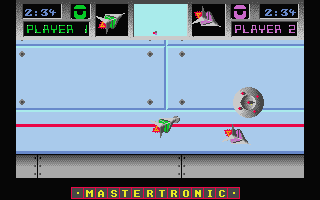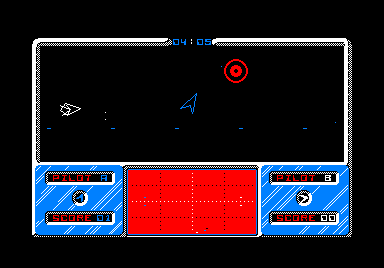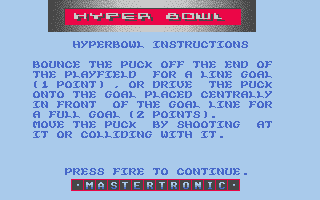Retro Replay Review
Gameplay
Hyperbowl delivers an exhilarating one-on-one duel that feels like the perfect fusion of soccer, air hockey, and high-speed spaceship combat. Viewed from a top-down perspective, each match focuses on a small slice of the rectangular pitch, demanding sharp reflexes and tactical positioning. You and your opponent pilot one of ten distinct ships, each boasting its own unique blend of speed, inertia, and firing arc. Mastery requires adapting to your ship’s quirks—some vessels accelerate quickly but struggle with precise turns, while others boast pinpoint control at the cost of slower bursts.
(HEY YOU!! We hope you enjoy! We try not to run ads. So basically, this is a very expensive hobby running this site. Please consider joining us for updates, forums, and more. Network w/ us to make some cash or friends while retro gaming, and you can win some free retro games for posting. Okay, carry on 👍)
The core objective is deceptively simple: push or shoot the ball into your opponent’s goal for two points, or nudge it just across the goal line elsewhere on the field for a single point. Striking the ball with your hull launches it in a semi-randomized trajectory that still reflects your intended direction, while firing the craft’s beam gives you a stationary shot from a distance. Neither method harms your rival craft, keeping the competition focused purely on skill and strategy. Walls lined with plus-shaped divots add unpredictable bounces that can turn a harmless pass into an unmissable scoring opportunity—or a sudden turnover.
Match lengths are brisk but intense: each battle runs for five minutes or until one player hits nine points. This structure keeps games high-octane and discourages turtling or runaway leads. For those seeking a longer challenge, Hyperbowl features three difficulty tiers, each with a five-match tournament ladder. As you progress, AI opponents become increasingly adept at anticipating your moves, forcing you to refine your tactics and choose ships that best counter the competition.
Graphics
Visually, Hyperbowl opts for a clean, futuristic aesthetic that prioritizes clarity and performance over photorealism. The pitch is rendered in sharp neon lines against a dark backdrop, allowing the bright ships and glowing ball to stand out instantly. This design choice not only contributes to the game’s high-speed feel but also ensures that fast-moving action remains legible even in the most chaotic moments.
Each of the ten ships sports a distinct silhouette and color scheme, making it easy to identify friend from foe at a glance. Subtle particle effects trail behind your craft during boosting or shooting, adding a sense of speed and impact. The occasional flash and dynamic shadowing around the ball’s rebound off the walls brings a satisfying visual punctuation to every play, reinforcing the unpredictable physics that lie at the heart of Hyperbowl.
While the arenas themselves lack decorative detail, their simplicity works in the game’s favor by keeping distractions to a minimum. A built-in scanner—or mini-map—sits at the corner of the screen, giving you a strategic overview of both ships and the ball. This interface element is crisply designed and updates in real time, ensuring you never lose track of the larger field even as your local view scrolls to follow intense scrambles.
Story
Although Hyperbowl isn’t driven by a deep narrative campaign, the game hints at a larger sci-fi universe where this high-speed sport has become the ultimate test of piloting skill. You can imagine corporate-sponsored leagues roaring through starports, with fans wagering credits on champion crews. The ten available ships feel like team mascots, each with lore suggesting why certain designs excel at offense or defense.
Between matches, brief loading screens offer glimmers of backstory: promotional posters for Hyperbowl’s Grand Invitational, schematic diagrams of prototype ships, and interview snippets from legendary pilots. These small details craft an atmosphere that goes beyond the stark arena, painting a picture of a competitive scene where reputations are forged through split-second decisions and razor-sharp reflexes.
For players seeking more narrative depth, this minimalist storytelling can feel light. However, it also leaves plenty of room for your own imagination. You become the architect of your Hyperbowl legend—crafting rivalries, dramatic comebacks, and highlight-reel goals that live on in your mind’s eye. The understated lore serves more as backdrop flavor than as a restrictive plot, letting the on-field action remain the star of the show.
Overall Experience
Hyperbowl excels as a pick-up-and-play sports shooter that rewards both quick reflexes and careful planning. Its streamlined rules and short match lengths make it ideal for casual sessions or intense competitive showdowns. The choice between ten distinct ships provides significant replay value, as you’ll naturally experiment to find the perfect balance of speed, handling, and firepower that complements your play style.
The built-in tournament ladders and escalating AI difficulty ensure there’s always a new challenge just around the corner, while the absence of damaging weapons keeps matches clean and purely skill-based. The scanner view adds a strategic layer, encouraging map awareness and positional play—no small feat when the local camera only shows a slice of the full pitch.
While the lack of a story-driven single-player campaign may disappoint some, Hyperbowl’s minimalist narrative approach leaves the focus squarely on fast-paced competition. Graphically sharp and mechanically deep, it’s a futuristic sport that appeals to gamers who crave high-speed, high-skill gameplay without unnecessary bells and whistles. For anyone looking to master a unique hybrid of sports and shooter genres, Hyperbowl is well worth the flight.
 Retro Replay Retro Replay gaming reviews, news, emulation, geek stuff and more!
Retro Replay Retro Replay gaming reviews, news, emulation, geek stuff and more!









Reviews
There are no reviews yet.